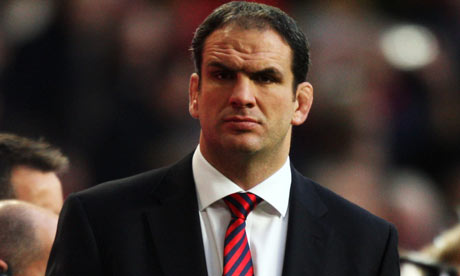
Continuity in selection has been a feature of Martin Johnson's first Six Nations as the England team manager and, once Toby Flood and Joe Worsley had been passed fit, it would not have taken long to decide that the side which started the rout against France last Sunday would take the field against Scotland this weekend.
A significant factor behind the departures of Johnson's immediate predecessors, Brian Ashton and Andy Robinson, was a concern about their selection policies. A revolving door operated, which hardly helped England establish a style players were comfortable with.
Performances came to reflect selection: inconsistent and unpredictable. The Rugby Football Union was so concerned in the Robinson era that it asked him to justify changes he made to its management board. It was not so much an attempt by the blazers to meddle in selection as to get Robinson to count to 10 and think everything through, rather than react to below average individual displays in frustrated, knee-jerk fashion.
Most of the changes Johnson and his selectors have confined themselves to in the Six Nations have been forced on them through injury. There have been four significant exceptions: Andy Goode was dropped at outside-half after the defeat to Wales in Cardiff, Joe Worsley stiffened the defence after Italy, Tom Croft started against France, offering pace and line-out prowess and Simon Shaw, offering a more physical presence at the breakdown, replaced Nick Kennedy in the second row against France. All four added to the side.
Goode's original selection against Italy on the opening weekend was unexpected, but England used that afternoon as a dress rehearsal for the tougher tussles that lay ahead in Cardiff and Dublin. Goode missed his first three tackles against Wales and ended up in the sin-bin, dropped to the bench for the clash against Ireland with Toby Flood promoted.
Flood does not match Goode as a tactical kicker, but he is far more adept at getting his back line moving, prepared to defer to Riki Flutey at inside-centre. While Tom Croft was named man of the match against France, Flutey's influence was profound: he scored two of his side's five tries and helped set up two others
Flutey was quick to spot space and attack it, something England failed to do last autumn when they moved the ball wide without creating room and kept losing the ball in vulnerable positions. They have tightened up since then, and if much of the criticism they received after Cardiff and Dublin bordered on the hysterical because it barely took into account the relative state of the three teams, they have a platform to build on but it will remain about awareness.
In recent years England, like France, have tended to deal in one-off performances, a reflection of their selection policies. What did the France coach, Marc Lièvremont, do after his side defeated the champions Wales last month? He made changes and broke up the one segment that he had left untouched in the opening three games and which had been outstanding against Wales, the back row. The result: a breakdown in communication between the two flankers after 60 seconds gave Flutey an opening and a try for Mark Cueto, injecting England with the confidence they needed.
England now have to follow it up against a Scotland side not as abject as their position in the table would suggest. The Scottish Rugby Union will next month carry out a review of the national set-up when the future of the head coach, Frank Hadden will be determined.
Hadden got his selection wrong in the opening match this year against Wales and the subsequent defeat saw him and his team on the back foot having promised something last November. He has made just one change for Twickenham from the side that pushed Ireland close, Scott Gray replacing John Barclay at open-side flanker, and with the Scots likely to continue with their open approach, Saturday could have a Super 14 scoreline if conditions are good.
Hadden has come under pressure north of the border and regularly has to deal with hostile questioning, but the bottom line is that he does not have many players who can make a real difference; he lacks quality. Who would replace him? Edinburgh are coached by one Andy Robinson, but would the SRU dare turn to an Englishman? Who selects the selectors?

